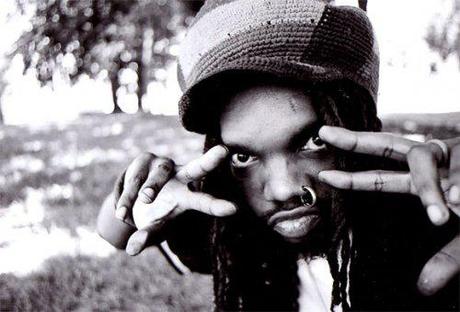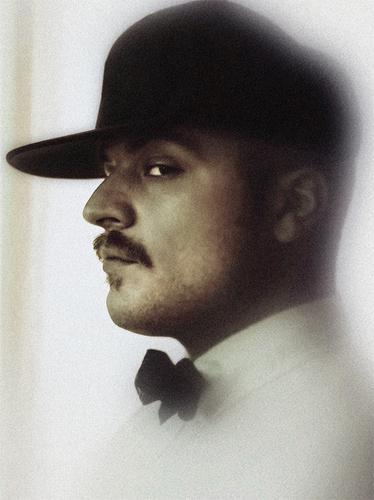
Khari “Conspiracy” Stewart, rapper in the Canadian indie hip hop group Supreme Being Unit

You may have seen my tweet about the upcoming documentary Mars Project, which tackles complex issues such as mental illness, drug use, psychiatry, race, and stigma. When director Jonathan Balazs contacted me about his film, I got really excited about it. If you want a hint of why check out this two-minute trailer:

If you liked this but want to learn more about the project, check out Balazs’s Indie-Go-Go page (the film is still in production and could really use your help). You might also be interested in the original short film, and my interview with Balazs below.
It’s great topic for Balazs to have chosen, and extremely courageous of “Conspiracy” to discuss and publicize his diagnosis of schizophrenia–a heterogenous disorder that is often swept under the rug, despite the fact that ~1% of the human population suffers from it’s symptoms. There is are a lot of misconceptions surrounding schizophrenia, and I think Mars Project will reach a lot of people that might otherwise be misinformed about the disorder. Further, with a neurotypical identical twin, I think “Conspiracy” is an especially great example of the complexity of psychiatric disease–although schizophrenia has a genetic component, it is far less heritable than autism, and GWAS studies have failed to turn up likely candidate genes.
Despite the difficulty of the problem, I think that genetics will give us the insights to explain schizophrenia biologically within my lifetime. But it will be important for psychiatrists and neuroscientists to remember the other side of biological reductionism–our experiences and thoughts are constantly affected the biochemistry of our brain. We need to explore the whole bio-psycho-social environment for therapies in addition to looking for cleaner drugs.

Jonathan Balazs
What inspired you to make a film where schizophrenia and mental illness plays such a central role?I felt like this whole process was an exercise in self-discovery. The whole process was cumulative, one that developed quite opposite of an Archimedean moment. I had some academic influences sure, but my education came from an innate sense of curiosity toward this mysterious and sometimes terrifying mental disorder called Schizophrenia. As I tried to pin down what it meant to me or how to make sense of it, the more elusive a definition came. I’m probably more confused by that label now than I was when I first began my inquiry.In doing research for the film, did you find any good resources explaining schizophrenia, mental illness, etc.?
Yes and no. Symptoms of Schizophrenia (and pretty much any mental disorder) are not so cut-and-dried like a knee-scrape or heart condition, as these are easily observable medical phenomenon. Schizophrenia on the other hand seems more like a philosophical concept, rather than a medical one – a split between a shared universally accepted human reality (if there is such a thing) and someone who’s simply too involved in their own mind. The dimensions of human expression are too complex, unpredictable and culturally influenced that there can be no concrete definition as they currently stand. I was quite surprised to discover a growing number of psychiatrist doctors who agreed with this and who defined people by their identity vs. their brain organ.
My research into these issues is ongoing, but I have found a great deal of value in the work of Dr. R.D. Laing (someone I wish I could have shared a drink with) and Dr. Thomas Szasz. I think it’s unfortunate that they have been labeled as patriarchs of the “Anti-Psychiatry” movement because there is value in what they have written. One of our interview subjects Dr. Gordon Warme has been a defining influence in my study of mental illness and on Mars Project. I’ve been trudging through Michel Foucault’s writings and wonder where the popular philosophers are in 2012 – it seems like they’ve been replaced by the theoretical physicists and astronomers.
What was it like to meet “Conspiracy” for the first time?
Loud, I think we were at a rap show.
How did you find the psychiatrists you interviewed for the film? Was it difficult finding academics willing to go on camera?
I have to give credit where it’s due; executive producer David Reville was instrumental in those interviews as I’m still very “green” with respect to disabilities studies and psychiatry. He was the one who put together the interviews with Dr. Gordon Warme, Dr. Kwame McKenzie and disabilities scholar Erick Fabris. We were very fortunate to receive insight from these people all doing important work in their area(s). I think the most difficult aspect of interviewing them was scheduling them all on the same day. I don’t think it could have been more successful honestly.
Do you think mental illness can be explained entirely through biology? Are you, yourself, a spiritual person?
Those are two different questions, I think. No, I don’t think the biological argument is entirely sufficient to explain these mental illness phenomena. I don’t think I’m qualified to say that there could never be a biological explanation, though I will note that ‘biology’ seems to be a primer for something that can’t be explained fully. I have too much respect for human culture to chalk up society as a vast network of neurons farting out serotonin and dopamine. For some people the medical model might ring true; those who do follow the path of the shaman in the white lab-coat are free to do so because the path of “recovery” (or more aptly management) lies within the individual.
I am not a spiritual person by most definitions and definitely not religious, I sometimes refer to myself as a rational agnostic.
What role do artists play in spreading scientific information?
I think it’s important that more artists recognize and value the influence of scientific discourse, though I admit that there is a concern with this information being presented accurately (and to an extent objectively) while still keeping with the identity of the artist. I would add that art and science are far too often pitted against each other when they’re essentially cut from the same cloth. It encouraged me to hear Dr. Kwame McKenzie discuss the art of psychiatric medicine in our interview.
After getting to know “Conspiracy” so well, are there parts of the psychiatric system or the way we address these illness,that you personally think need to be changed?
I can only say what I might do for myself, because fixing the mind lies with the patient alone – psychiatry is just one of the tools available. If I ever suffer from prolonged psychosis, who knows what I’d do? My feeling though, is that many of these potent, mind-altering psychiatric drugs are prescribed too freely – as if the answer to your crisis can be sought through a little pill. Some of these drugs essentially dull every aspect of your spirit and not just those undesirable or offensive aspects of behavior. The systematic, state-imposed ‘zombification’ of vulnerable individuals doesn’t seem like the best path; some might read this and ask what business a filmmaker has on mental health policies.
When will the movie be released, and do you have other upcoming projects?
The film will be completed by the fall and hopefully it will hit festival screens in the autumn. I hope that we’ll be able to negotiate wide distribution in theatres and certain online and V.O.D. platforms. With the amount of cussing in the film, I doubt that many networks will want to program it on their channels.
I’m working on a short documentary featuring the work of illustrator Pearl Rachinsky and I’m hoping to shop around an expanded treatment based on a short film I wrote a few years ago called Thane Spa on the monetization of suicide.
For more information on Mars Project see www.marsprojectmovie.com, ‘like’ us on Facebook, check our Youtube channel and please help us support our indiegogo campaign. I’m a little too serious on Twitter, but you can follow me just the same @BrandoBalazs.
———————-
Know of any good movies or documentaries out there about mental illness or schizophrenia? I need to watch something while I wait for Mars Project, so suggestions would be great!

